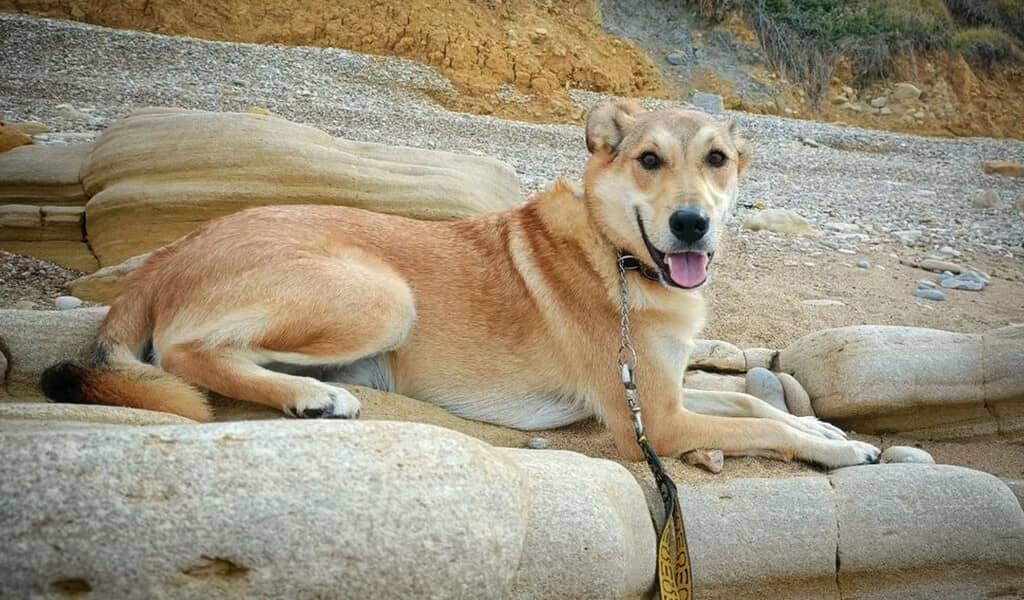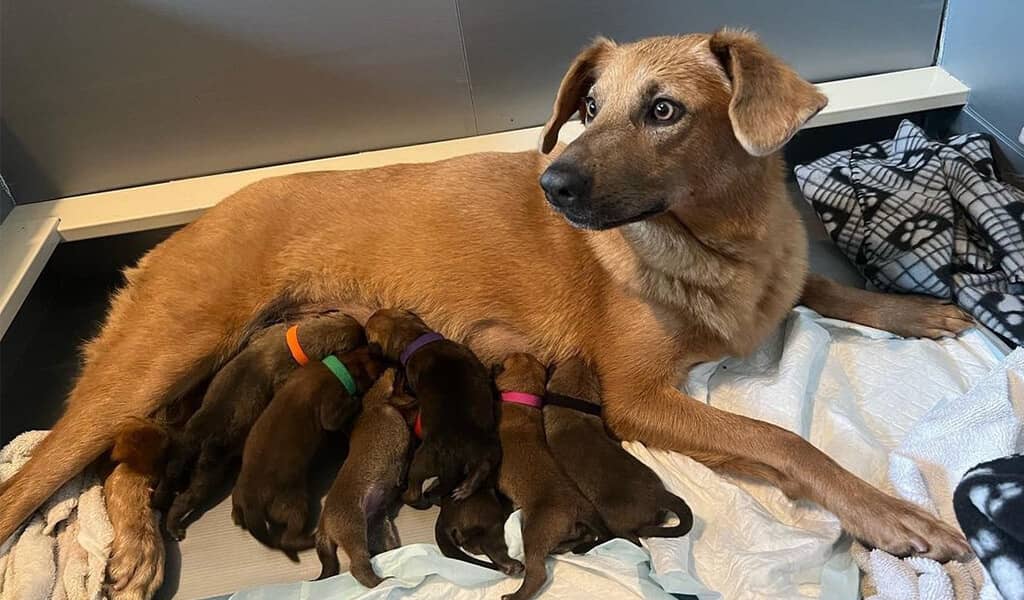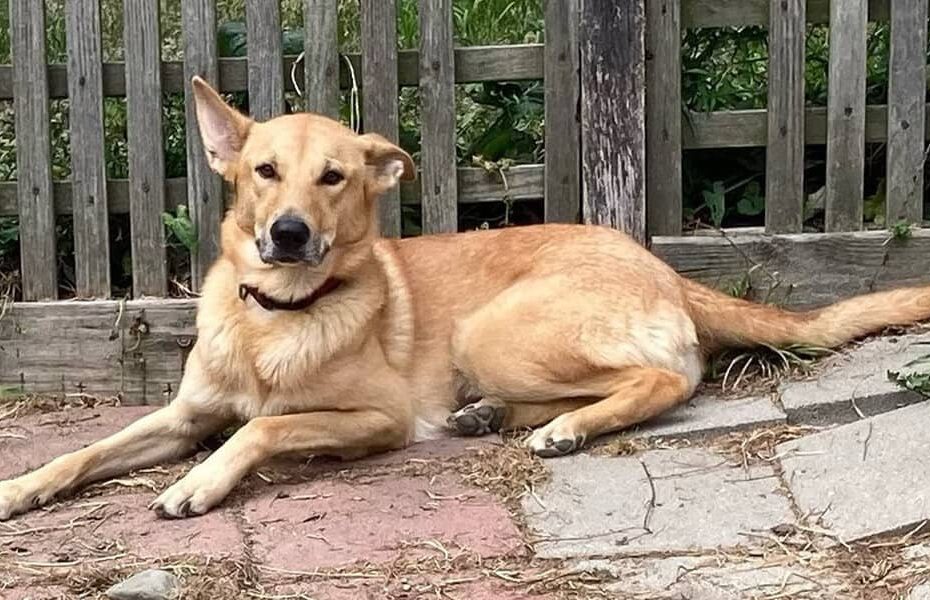Chinook dog is the rare sled breed. Chinooks have a reputation for being gentle with children and other animals. Chinooks are gentle, people-oriented dogs with a special feel for children.
The Chinook breed is a rugged working dog and dedicated family pet known for intelligence, patience, and eagerness to please. And He is the pride of Wonalancet, New Hampshire.
Chinooks make excellent hiking and backpacking companions, and they excel at dog sports such as sledding and skijoring. They also excel at agility, herding, obedience, and rallying.
Highlights
- History of Chinook Dog
- Chinook Dog Overview
- Appearance
- Temperament
- Health
- Chinook Dog Care
- Advantages and Disadvantages
- Image
History of Chinook Dog
The Chinook is the state dog of New Hampshire, and the breed was founded in the early 1900s by the state’s own Arthur Walden. This breed derives principally from one male ancestor birth in 1917, named “Chinook”, who was Walden’s lead dog and stud.
Chinook is the product of a cross between a female Greenland Dog from the Peary North Pole expedition and a large, tawny male Mastiff. The breed suffered after Walden died in 1947. The Chinook population declined, and Guinness World Records named it the rarest dog breed 20 years later.
Chinook enthusiasts around the world took on the responsibility of bringing this unique dog breed back. The Chinook was later accepted as a Working Group member by the American Kennel Club in 2013.
Chinook Dog Overview
- Origin: United States
- Breed Group: Working
- Height: 24 to 26 inches and Bitches 22 to 24 inches
- Weight: 60 to 75 pound and Bitches 50 to 65 pounds
- Life Span: 12 to15 years
- Breed Size: large
- Temperament: Friendly, intelligent, loyal, calm and alert
- Intelligence: high
- Shedding Amount: high
- Exercise Needs: medium
- Energy Level: medium
- Barking Level: low
- Coat: Medium-length smooth fur
- Color: Fawn, red-gold, silver fawn, tawny, palomino, or gray-red with dark markings
- Shading amount: medium
- Litter Size: 3-6 puppies
- Type: Purebred
- Hypoallergenic: No
- Puppy Price: Average $800 – $1200
Appearance
The Chinook has a double coat can be quite thick depending on the climate the dog lives in. Chinooks are a double coated breed. Their undercoats are short and dense, with a down-like texture that provides much-needed insulation in cold weather. Their outercoats are straight, short, and coarse, with longer hair on the ruff.
The Chinook breed’s compact muscular frame is ideal for this gentle sled dog. The body is well balanced, its the chest is deep, the bone is moderate, and the musculature is flexible. Their skin on the head is tight and wrinkle-free. The eyes are almond-shaped, medium in size, and have an intelligent expression. The eye rims are darkly pigmented. The feet are oval in shape, strong and compact.
The lips are a dark color. The top lip slightly overhangs the lower lip, and the lower lip are corners slightly pendulous. The tail is thick at the root and thins out towards the tip. When the dog stands, the tail hangs downward, almost to the hocks. The tail is carried up when the dog moves.
Temperament
This breed is known for being a gentle and friendly dog who gets along well with and other animals. This dog is large, the is not aggressive and has even been known to be shy at times. The Chinook is a very intelligent dog that was originally bred as a weight-bearing sled dog.
The Chinook is graceful but purposeful, alert and calm. His intelligence is reflected in his expression. Most Chinooks make excellent children’s pets. The Chinook is a loving and playful family pet with a special fondness for children. who is eager to please as well as eager to learn.
The Chinook’s abilities are strongly trainable, adaptable, and versatile. The Chinook is gregarious with other dogs and works well in groups and family packs. The Chinook is a dignified dog, while some may be reserved around strangers
Health
Chinooks dog are generally healthy, but like all breeds, they can be subject to certain health conditions. Not all it will get any or all of these diseases, but it’s important to be aware of them if you are considering this breed.
The amount of food adult dog consumes is determined by his size, age, build, metabolism, Body structure, and activity level. Health problems seen in this chinook include hip dysplasia, cataracts, seizures, skin and coat problems, and gastrointestinal issues.
Chinooks should have health clearances from the Orthopedic Foundation for Animals for hips, as well as Canine Eye Registry Foundation certification that the eyes are normal or not. For chinook The National Breed Club recommends the following health tests:
- Hip Evaluation
- Ophthalmologist Evaluation
Chinook Dog Care
Chinooks dog need a moderate amount of exercise, but they do not require as much activity as many other working breeds. This breed is highly trainable and eager to enjoys pleasing its owners. its proper grooming is also essential.
Feeding
Chinook dog require high-quality protein-rich nutrition to maintain and develop their muscles. The amount of food chinook adult dog consumes is determined by his size, age, build, metabolism, and activity level. The amount of food adult dog consumes is determined by his size, age, build, metabolism, and activity level.
Feed Chinooks dog a high-quality food that is appropriate for their life stage. Consider a diet designed specifically for active breeds. To avoid overfeeding Chinooks, portion out their food with a measuring cup and limit treats to no more than 10% of their daily calories.
For chinook dog is the best raw diet because gives control over what you feed chinook and is based primarily on feeding raw, meaty bones and food.
Grooming
Chinooks have two coats to keep them warm in cold weather, and they shed heavily twice a year. During these seasons, daily brushing and occasional de-shedding baths can help control stray fur.
The coat of this breed does not need to be trimmed, but it owners should maintain regular grooming care such as teeth brushing and ear cleaning to keep their dog healthy.
As with all breeds, the nails should be trimmed on a regular basis because overly long nails can be painful for the dog and cause walking and running issues.
Exercise
Chinooks adore their people and will not be content living outdoors apart from them. They can adaptable to most homes as long as their exercise requirements are met. These energetic dogs require 30 minutes to an hour of daily exercise in the form of long walks and opportunities to run in large , safely enclosed areas are needed.
Positive reinforcement techniques should be used to train the intelligent and sensitive Chinook. Working with a trainer to learn how to redirect unwanted behaviors and reward desired behaviors is even better.
Housetraining should not be difficult if you make it a positive experience for dog and provide him with a regular potty schedule and plenty of opportunities to go outside. Crate training is an excellent tool for housetraining and preventing young puppy from chewing on inappropriate items.
Advantages and Disadvantages
Advantages
- Simple to train
- Loyal and affectionate
- For Pets and children are friendly.
Disadvantages
- Excessive shedding
- Rare breed; difficult to find
- Should not be left alone
ALSO READ: Chinook dog reviews
Image



